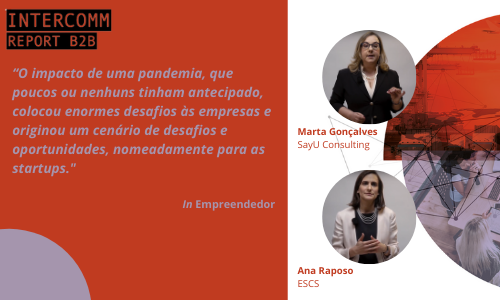
The future belongs to the most agile
The impact of a pandemic, which few, if any, had anticipated, has posed enormous challenges for companies and created a scenario of challenges and opportunities, particularly for startups.
On the one hand, the startups and entrepreneurs are not immune to the current state of the market and the difficulties shared by most organizations. These include financial and investment difficulties, the need to restructure teams and reallocate resources, and the ability to make themselves heard and differentiate themselves in a context of increased "noise".
At the same time, since it wasn't possible to use trends, history, projections and long-term planning, organizations had to think differently. Even organizations with a robust structure have had to "navigate by sight" in this context of unpredictability.
Despite not focusing on entrepreneurship, the results of the study "InterComm Report - B2B Communication Trends in Global Businesses (InterComm)", developed by School of Social Communication of the Polytechnic Institute of Lisbon and the SayU Consulting - Evoke Networkwith the support of aicep Portugal GlobalThis also allows us to consider the possible paths for this type of company, in the light of the responses obtained from national B2B exporting companies, regarding the role of communication in building and managing relationships with their customers. stakeholders.
In this context, the importance of the strategic vision will remain and it will have to continue to act as the guiding light for companies' activities, but the action plans promise to vary according to the challenges that arise. It has proved necessary to learn and adapt, considering as many alternative scenarios as possible at any given time.
In this logic, a startup may be better prepared to thrive in an environment of greater flexibility, in which the reinvention of work processes, the use of new platforms and the ability to rethink segments to be reached and the actions to achieve them must happen with enormous speed and efficiency.
An example of this transformation trend is the greater importance of digital. The specific challenges brought about by the current crisis have introduced a profound digitalization of business activity. This boost technology, clearly expressed in the responses obtained in this study, was already on the horizon for many organizations, but has now emerged with increased urgency and speed of implementation and promises to leave behind those who do not make an effort in this direction.
Significantly more consumers and companies have started using technological channels to buy and sell products and services during the pandemic. It is estimated that this rapid and unprecedented adoption by consumers and businesses has reached figures identified for projections of a few years in mere weeks. Adaptation is crucial, given the creation of new buying habits among consumers, and the weight of concepts such as security, convenience and speed. The startups seem more inclined to try to respond to these changes, with a natural focus on the logistics and IT sectors.
It is the organizations that are quickest to act that will thrive. It is necessary to understand how to make use of speed, frequency of contact and economy in the use of resources - not just in terms of products and services, but also business models and processes - and to develop skills in managing complex systems with various stakeholdersin a hyperconnected world.
It is in this dimension of a networked business world that Communication assumes its full role. If it has been seen as a minor issue, it is now emerging as a function of growing importance, assuming a new priority position among the strategic thinking of many companies. Considered to be the "voice" of brands, Communication is seen as an anchor to inspire trust with the different stakeholders. stakeholders.
It can be seen that in a large number of companies there is no organized, cross-cutting communication structure, which is merely referred to as sales and marketing support. Purely operational communication tailored to the interlocutor or even without any relation to strategic objectives seems to be the reality in the vast majority of our business fabric.
The scenario in which we have been living for more than a year, and which we are not sure when it will end, has made it clear that it is time for the top management of companies to understand what contribution communication can make to making companies more competitive. It is possible for a company to survive without communicating, but it will be more efficient if it intentionally and strategically manages the communication processes with the different stakeholders. stakeholders.
It is important for everyone, including entrepreneurs, to be aware of the trends that are shaping the market at this level, and to try to integrate possible avenues of intervention into their own strategies.
*Article by Ana Raposo, Professor at the School of Social Communication and Pro-President for Strategic Communication at the Polytechnic of Lisbon and Marta GonçalvesManaging Partner of SayU Consulting.
In Entrepreneur
